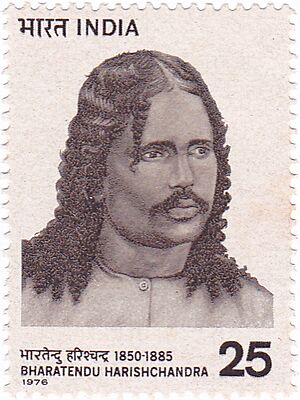Bharatendu Harishchandra facts for kids
Quick facts for kids
Bharatendu Harishchandra
|
|
|---|---|
 |
|
| Born | 9 September 1850 Benares, Benares State, British India |
| Died | 6 January 1885 (aged 34) Benares, Benares State, British India |
| Pen name | Rasa |
| Occupation | Novelist, poet, playwright |
| Language | Hindi |
| Notable works | Andher Nagari |
| Top - 0-9 A B C D E F G H I J K L M N O P Q R S T U V W X Y Z |
Bharatendu Harishchandra (born September 9, 1850 – died January 6, 1885) was a very important poet, writer, and playwright from India. Many people call him the "father of Hindi literature" and "father of Hindi theatre". He wrote many plays, short stories, and travel books. He used new ways like newspapers, letters, and translations to share his ideas with the public.
Writing under the pen name "Rasa," Harishchandra focused on the problems faced by ordinary people. He wrote about poverty, how India depended on others, and the struggles of the middle class. He also stressed the need for the country to move forward. He was known as a brave journalist who spoke out against old, unfair customs. He also criticized religious leaders who misused their power. He was a strong supporter of Hindu traditions and used his writings to explain Hindu beliefs.
About His Life
Bharatendu Harishchandra was born in Banaras (now Varanasi) in 1850. His father, Gopal Chandra, was also a poet. Sadly, his parents passed away when he was young.
When he was about 15, in 1865, he traveled with his family to the Jagannath temple in Puri, Orissa. This trip greatly inspired him. He saw the changes happening in Bengal and decided to bring similar ideas to Hindi literature. He started translating plays and novels from other languages into Hindi. For example, he translated the Bengali play Vidyasundar into Hindi in 1868.
Harishchandra was also a magazine editor. He worked on popular magazines like Kavi Vachan Sudha, Harishchandra Magazine, Harishchandra Patrika, and Bal Vodhini.
In 1880, scholars in Kashi gave him the special title "Bharatendu." This means "The moon of India." They gave him this honor because of his great work as a writer and his efforts to modernize Hindi literature. He was married and had one daughter.
His Ideas and Beliefs
Bharatendu Harishchandra was a strong supporter of Hindu traditions in North India. He believed in respecting old customs while also engaging with the modern world. He thought that Hindu religious matters should be handled by traditional Hindu scholars, not by those who only studied Western ideas.
He used new ways, especially publications, to share his thoughts with many people. By doing this, he helped the modern Hindi language grow. He also used his writings to explain Vaishnava devotionalism, which is a part of the Hindu religion. He believed in worshipping images and devoted himself to one God. This was his way of responding to criticisms of Hinduism from Western thinkers.
Even though Urdu was widely used in North India at the time, Harishchandra worked hard to bring back Hindi as an important language. He asked people to use Indian-made goods (called Swadeshi) and demanded that Hindi replace Urdu in courts. He also campaigned for a ban on cow slaughter. He even took his request for a ban to the Delhi Durbar, a big assembly held by the British. Although the ban didn't happen, he was given the title "Vir Vaishnava" (Brave Vaishnava).
Important Works
Bharatendu Harishchandra was not just a writer; he also became a director and manager of plays. He used theatre to share his ideas and influence public opinion.
Plays He Wrote
- Vaidika Himsa Na Bhavati, 1873 (वैदिक हिंसा न भवति)
- Satya Harishchandra, 1876 (सत्य हरिश्चन्द्र)
- Bharat Durdasha, 1875
- Niladevi, 1881 (नीलदेवी)
- Andher Nagari (अन्धेर नगरी, meaning "City of Darkness"), 1881: This is a very famous play in modern Hindi drama. It's a funny but sharp criticism of society and politics. Many famous Indian directors have translated and performed it.
His Poetry
- Bhakta Sarvagya (भक्त सर्वज्ञ)
- Prem Malika (प्रेम मालिका), 1872
- Prem Madhuri (प्रेम माधुरी), 1875
- Prem Tarang (प्रेम तरंग), 1877
- Prem Prakalpa (प्रेम प्रकल्प), Prem Phulwari (प्रेम फुलवारी) and Prem Sarowar (प्रेम सरोवर), 1883
- Holi (होली), (1874)
- Madhumukul (मधुमुकुल), 1881
- Raga Sangrah (राग संग्रह), 1880
- Varsha Vinod (वर्षा विनोद), 1880
- Vinay Prem Pachasa (विनय प्रेम पचासा), 1881
- Phulon Ka Guchchha (फूलों का गुच्छा), 1882
- Chandravali (चन्द्रावली), 1876 and Krishnacharitra (कृष्णचरित्र), 1883
- Uttarardha Bhaktamal (उत्तरार्द्ध भक्तमाल), 1876–77
One of his famous poems talks about the importance of one's own language: निज भाषा उन्नति अहै, सब उन्नति को मूल ।
बिन निज भाषा-ज्ञान के, मिटत न हिय को सूल ।।
विविध कला शिक्षा अमित, ज्ञान अनेक प्रकार।
सब देसन से लै करहू, भाषा माहि प्रचार ।।
This means: Progress comes from one's own language (mother tongue), as it is the root of all progress. Without knowing your mother tongue, the pain in your heart won't go away. Many arts and endless education, many kinds of knowledge. Should be taken from all countries, but spread in one's own mother tongue.
Translations He Made
Bharatendu Harishchandra translated many important works into Hindi:
- Harsha's Ratnavali (रत्नावली)
- Vishakhadatta's Mudrarakshasa (मुद्राराक्षस)
- Ramprasad Sen's Vidyasundar (विद्यासुन्दर) from Bengali
- Karpuramanjari (कर्पूरमञ्जरी) from Prakrit
- Shakespeare's Merchant of Venice as Durlabh Bandhu (दुर्लभ बन्धु), meaning Invaluable Friend
Essay Collection
- Bharatendu Granthavali (भारतेन्दु ग्रन्थावली), 1885
Bharatendu Harishchandra Awards
The Indian government's Ministry of Information and Broadcasting gives out the Bharatendu Harishchandra Awards. These awards started in 1983 to encourage new writings in Hindi about mass communication.
See also
- Bharatendu Natya Academy
- Moti Chandra
 | James Van Der Zee |
 | Alma Thomas |
 | Ellis Wilson |
 | Margaret Taylor-Burroughs |

